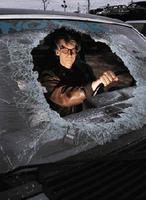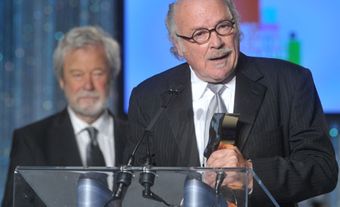This article was originally published in Maclean’s magazine on May 27, 1996. Partner content is not updated.
In the seaside town that the movie industry turns into Babylon on the Riviera for two weeks each May, almost nothing comes as a shock. No one, however, was quite prepared for Cronenberg's Crash - an utterly bizarre movie about characters who have an erotic addiction to crashing cars.
Cronenberg Film Controversy
It is 4 a.m. The final weekend of the Cannes International Film Festival. And the Croisette, the Côte d'Azur's fabled promenade, is buzzing. Across from the vintage Carlton Hotel, its ice-cream-cone turrets lit up against the night, dance music booms from a lavish beach party for the gala première of Crash. David Cronenberg, the movie's Canadian director, has retired for the night. But the champagne is still flowing. The dance floor is jammed. And about 100 spectators line the railing of the Croisette, some still trying to crash the Crash party, others just gazing down on the action below. Making his way through the crowd, a guest with his tuxedo shirt unbuttoned to the waist strolls home with a woman spilling out of a sequinned dress. Two young lovers lean up against a car and melt into a long kiss.In the seaside town that the movie industry turns into Babylon on the Riviera for two weeks each May, almost nothing comes as a shock. No one, however, was quite prepared for Cronenberg's Crash - an utterly bizarre movie about characters who have an erotic addiction to crashing cars. Films competing for the festival's coveted Palme d'or ranged from the Coen brothers' black-humored Fargo, set in the snows of Minnesota, to Bernardo Bertolucci's languorous Stealing Beauty, set in the Tuscan hills (page 53). But landing on the climactic Friday night of the festival, Crash's austere excursion into expressway sex in Toronto was the competition's most hotly anticipated entry - and by far the most provocative. It left audiences stunned, disturbed and wondering what they were supposed to think. It also provoked ferocious debate among members of the Cannes jury - including a Canadian for the first time in the festival's 49-year history, Toronto director Atom Egoyan.
Crash is not an easy movie to explain, perhaps because there has never been anything like it. Based on the 1973 novel by British author J. G. Ballard, best-known for Empire of the Sun, the story concerns a movie producer named Ballard (James Spader) and his wife, Catherine (Deborah Unger), who practise a bored promiscuity. Ballard is injured in a serious collision with another car driven by a doctor named Helen (Holly Hunter), who introduces him to a bizarre cult - led by a scarred voyeur named Vaughan (Elias Koteas). He is addicted to an extreme form of rough sex: he likes to do it in cars - preferably vehicles that are either moving or freshly wrecked. The ultimate high is the actual moment of impact.
A connoisseur of collision, Vaughan also likes to restage legendary accidents, such as the ones that killed James Dean, Grace Kelly and Jayne Mansfield. Using movie references, Cronenberg fuel-injects Ballard's humorless book with a sly wit - he restages Dean's death-by-Porsche in a scene that turns into a deft parody of the drag-race scene in Rebel Without a Cause. And as the sex games accelerate, they shift into grotesque overdrive. "Can I give you a lift?" becomes a loaded question. In one extreme scene, Ballard claws his way through the metal leg braces of a disabled woman played by Rosanna Arquette. The movie includes sex between men, between women, between men and women - and, in the final analysis, between man and machine.
At the first press screening in Cannes, the packed audience of 1,000 international media watched the film with a palpable discomfort. Coughing fits erupted with alarming frequency, as if Cronenberg had released an insidious virus into the audience's nervous systems. When the screen finally turned black, bravos mixed with some loud boos. Some critics detested the film, some adored it, others were simply baffled.
Milling around on the sidewalk below the steps of the Palais, a throng of journalists discussed the movie long after it was over. Scouts for Alliance Communications Corp., the producer, solicited instant opinions, but many critics were too puzzled to respond. "It's obviously in the shape of a porno movie," offered Derek Malcolm, critic for Britain's Guardian. "One must trust Cronenberg because he's an intelligent director. I can't fathom what he was trying to do, but I would give him the credit for trying to do something." Malcolm also predicted that Britain's censor would ban the film unless it received extensive cuts. (Later, Hollywood's show business bible, Variety, calling the film "a forbiddingly frigid piece of esoteric erotica, with appeal only to the most specialized audiences," predicted similar censorship problems in the United States.)
In fact, Crash belongs to a genre for which there is no prototype. It could be confused with pornography, in that it contains perhaps as much sex as dialogue - at least a dozen sexual acts, mostly in vehicles. The film opens, with three sex sequences in a row, beginning with a scene of Unger placing her breast against the enamelled fuselage of an airplane. But unlike porn, Crash does not titillate. It is so cool, so exquisitely composed and so cerebral in its immaculate design that it is almost impossible to empathize with the characters - to embrace their fantasies.
"I'm not sure you're going to like anybody in Crash," the director acknowledged in an interview. "It is a difficult film to access, but you can observe something from a distance and still be fascinated by it." In making formula Hollywood films, he adds, "you know which buttons you're supposed to push and if you're professional enough to push them, you get the required response. Here I'm pushing buttons that nobody knew they had before, and I'm groping in the dark for those buttons. I'm not sure which ones I'm pushing."
Booing films is a Cannes tradition. And after receiving mixed reaction in two advance press screenings, the film-makers were braced for the worst. But at a follow-up news conference, where they expected a barrage of hostile questions, journalists were so polite that Cronenberg later perversely admitted he was "a bit disappointed." He was also ready to be booed at the movie's black-tie première the next night - "We were pumped," he said. But despite some walkouts, the audience of 2,000 black-tie spectators paid respectful attention. And at the end, their stunned silence was broken by a burst of applause along with a mix of cheers and jeers.
Hunter noted in an interview that on the Crash set, unlike most sets, the actors never speculated about how the audience would react. "And that's one of the strengths of David Cronenberg's movies," she said. "They never dictate to an audience how they are supposed to feel." Filmed mainly on and around the expressways of Toronto, Crash is not character-driven. It is a movie about flesh and metal, and a violent desire to close the gap between man and machine. It is about hard, impenetrable surfaces and the latent desire to break them, to create a ragged, discolored edge - a scar - in a world paved with white lines.
Cronenberg has devoted his career to exploring revolts of the flesh. In Shivers (1975), his first commercial movie, venereal parasites turned people into sex-crazed zombies. It was the first in a string of biological horror movies, from Rabid (1976) to The Fly (1988), that dealt with grotesque mutations of the flesh. Cronenberg was morphing the human body long before computers did. Warped flesh became his hallucinogenic metaphor for the repressed libido, a plastic-fantastic other.
Some of his films were specifically erotic, notably 1983's Videodrome. And in Dead Ringers (1988), Naked Lunch (1991) and M. Butterfly (1993), the director performed radical surgery on sexual identity. But with Crash, Cronenberg finally confronts eros head-on. This time, nothing is a metaphor for sex; sex is a metaphor for everything else.
For a creator of such cold and twisted films, the 53-year-old director seems remarkably well-adjusted. He is a family man. (Married to his second wife, Carolyn, for 18 years, he has three children, aged 24, 16 and 11.) And despite his fascination with ideas and objects, he elicits unswerving, almost cult-like, affection and loyalty from actors. "The first moment I met him it was like meeting the oldest friend in the world," says Spader. "He's enormously relaxed and lighthearted on the set." And Unger, 29, the Vancouver-born actress who performs the film's most graphic sex scenes, calls him "one of the most elegant and trust-inspiring men I've ever known. He's gentle. He's precise. There's a calmness and wit about him. And he's not abusive."
Unger won acclaim in Cannes for her risky, coolly intense performance. She recalls that when she first read Cronenberg's script, "it felt like a mind-rape." But it got under her skin, she says, "like something was skating through my veins," until she began to appreciate its beauty. Spader, too, said he was afraid of the material at first. "But I was excited by that fear, and by the provocation," he explains. "Eventually, the fear became the blood of the film."
Cronenberg made it a priority to create a protected environment for his actors on the set. "When you're doing sex scenes, it's crucial," he says. He let the actors watch instant replays of their takes on a TV monitor so they could see what they looked like. "That way, there would be no surprises," he adds. "It was a very sexy set, but it was sort of a family sex. It was, I suppose, incestuous in that sense." Much of the film was shot at night last fall on Toronto's expressways. "Having the expressways shut down gives you a sense of specialness," he says. "The city is yours, literally. So for us, the whole city became eroticized."
Every director is, in some sense, a voyeur, according to Cronenberg. "If you don't enjoy some element of voyeurism," he says, "then you're in the wrong business. Every day, the set was charged with sexuality, and there is a deliciousness in ignoring it, in having a professional distance. Even when there isn't any overt sexuality in front of the camera, a film set is a very sexually charged place. You're never surprised that strange people have affairs. You're just as likely to want to have sex with the props person as the leading lady. And one does. Later, you realize that these are things that should be enjoyed but not acted upon."
Crash, of course, is not just about sex, but about cars, too. And Cronenberg has more than a passing affinity with the automobile. He owns a Ferrari, a Porsche, a Range Rover and an Audi, four race cars and five motorcycles. He quit racing two years ago after towing his 1961 Cooper Formula One car to the track one Saturday. "Suddenly, I just didn't want to be there," he says. "I was lonely. I missed my family. It had nothing to do with fear."
Cronenberg himself has never been in a serious accident. But he was hit by a car driven by a priest once while driving up Bay Street in Toronto. His shoulder is scarred from crashing a motorcycle during a race. And he escaped uninjured after driving a Ferrari into a wall at Ontario's Mosport track in the mid-1980s. After a Crash screening in Los Angeles, "a guy came out yelling and waving his arm, which was in a cast," the director recalls, "and he said, 'I like Cronenberg's films, but I think he's gone psycho with this one. I've been in a motorcycle accident and there was nothing sexy about it.' Well, I've been in a motorcycle accident, and frankly I think there was something sexy about it."
Whether they like it or not, people are interested in road accidents, the director adds. "There is a car-crash esthetic. People are fascinated by what they look like when they're dismantled, by what happens to a body on impact. You could say it's ghoulish, but then everybody's a ghoul. If you turn away, that's one thing. And if you avidly watch, that's another. But you can't be neutral."
Crash focuses more on the aftermath of collision than on the event. It suggests an esthetic of mutilation, which Cronenberg compares to ritual scarification practised by certain tribes. He also compares it to the painful rituals of bodybuilding. "I've worked out with weights a lot," he says. "And I watch the bodybuilding shows on TV. Most people just see these bulging veins - like someone on a surgical table who's had his muscles exposed. But once you get into it, there's a beauty to it."
In Crash, Vaughan describes his auto-erotic obsession as "something we are all intimately involved in, the reshaping of the human body by modern technology." And bodybuilders engage in a similar experiment, said the director. "In terms of dieting, controlling what metals go into their body, it gets very arcane. These people are beyond human. No one has ever looked like that."
With his career, meanwhile, Cronenberg is building a unique body of work. He regularly turns down Hollywood offers to pursue his vision. Projects on his rejection list have included Top Gun, Beverly Hills Cop, The Firm, Seven, The Juror and the upcoming Aliens 4. Cronenberg's next project is another movie about cars. Titled Red Cars, it is the story of a racing driver, and it sounds more accessible than Crash. But in the end, Cronenberg's uncommercial choices have paid unique dividends. "Dead Ringers didn't make money, but it has been great for my career," he said. "Actors want to work with me. Jeremy Irons mentioned me at the Academy Awards. It depends what kind of career you want to have."
The morning after the gala première of Crash, its stars and director - groggy after a long night of parties, drift into the penthouse casino of the Carlton Hotel to begin a day of interviews. A publicist scans the sea and wonders which of the big yachts parked offshore belongs to Cher. "Have you been on a yacht yet?" she asks. "I want to go on a yacht." Stepping out onto the balcony, Rosanna Arquette says: "I'm wiped out. I'm totally numb." Cronenberg inquires about his helicopter to Monaco the next day. While the Cannes jury argued over who should take home the festival's grand prize, the director would be watching another Grand Prix - the legendary car race. Once again, David Cronenberg's priorities are clear - and all his own.
Maclean's May 27, 1996

 Share on Facebook
Share on Facebook Share on X
Share on X Share by Email
Share by Email Share on Google Classroom
Share on Google Classroom


